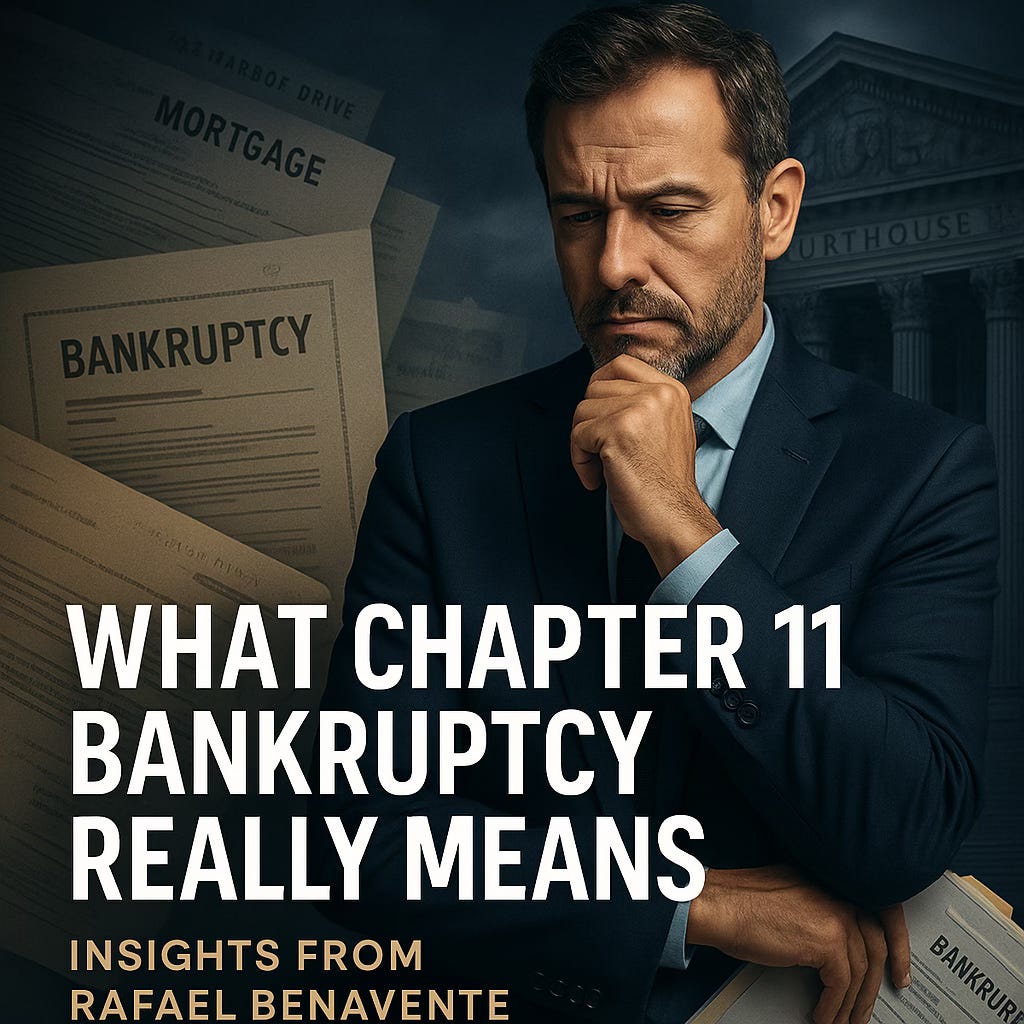What Chapter 11 Bankruptcy Really Means — Insights from Rafael Benavente
By Rafael Benavente
What Chapter 11 Bankruptcy Really Means — Insights from Rafael Benavente
When people hear the word “bankruptcy,” they often imagine failure, foreclosure, or financial ruin. But in reality, Chapter 11 bankruptcy is not the end—it's a powerful legal process for reorganization, survival, and strategic reset.
Entrepreneur Rafael Benavente knows this firsthand. With experience in real estate, private equity, and distressed asset management, Benavente has navigated the complex world of Chapter 11 not as a defeat, but as a strategic business tool. In this post, we break down what Chapter 11 really means—and why more business owners should understand its potential.
💼 What Is Chapter 11 Bankruptcy?
Chapter 11 is a section of the U.S. Bankruptcy Code that allows individuals or businesses to restructure their debtswhile continuing to operate. Unlike Chapter 7 (liquidation) or Chapter 13 (personal repayment plans), Chapter 11 is often used by:
Corporations
LLCs
High net-worth individuals
Real estate developers
Investors
It gives the debtor a chance to propose a plan to pay back creditors over time—often with reduced balances, extended terms, or asset sales.
🧠 Rafael Benavente’s Key Insight:
“Chapter 11 is not a panic button—it’s a planning tool. If you’re prepared and transparent, it can preserve your business, protect assets, and neutralize legal chaos.”
🧾 How Chapter 11 Works (in Plain English)
You File a Petition: This initiates the automatic stay, which halts lawsuits, collections, and foreclosures.
You Propose a Plan: This includes how you’ll repay secured creditors, unsecured creditors, priority claims (like taxes), and maintain operations.
You Negotiate with Creditors: Creditors vote to approve or reject your plan.
Court Confirms the Plan: If approved by the court, you execute the plan over 3 to 5 years (or longer for complex reorganizations).
You Exit: If successful, you emerge from bankruptcy with restructured debts and a clean operating structure.
⚖️ The Power of the “Automatic Stay”
As Benavente emphasizes, one of the biggest immediate advantages of Chapter 11 is the automatic stay:
Stops foreclosure or eviction
Pauses lawsuits and wage garnishment
Freezes IRS collections
Provides breathing room to restructure
This legal shield can mean the difference between saving or losing a business, home, or portfolio.
🏗️ A Tool for Real Estate and Investment Recovery
Benavente points out that Chapter 11 is especially effective for:
Distressed properties
LLCs with real estate holdings
Complex personal guarantees
Judgments and liens
“If you’re carrying multiple properties or a structured portfolio, Chapter 11 gives you the framework to renegotiate everything without panic selling,” he notes.
🧮 Common Misconceptions
MisconceptionReality“You lose everything in bankruptcy.”Chapter 11 is about preserving value and reorganizing, not liquidating.“It ruins your credit forever.”While your credit takes a hit, it can recover faster if debts are reduced and paid.“Only big corporations can file Chapter 11.”Individuals with significant income or assets often use it—especially those with real estate, lawsuits, or business obligations.“It’s unethical to file bankruptcy.”The law exists to help honest but overwhelmed debtors reset. It’s a legal right—not a loophole.
💬 Insights from the Trenches
Benavente shares that his experience taught him the importance of:
Transparency with the court and creditors
Building a credible reorganization plan early
Keeping detailed financial records and forecasts
Controlling the narrative with facts—not emotion
He also recommends working with a team:
A bankruptcy attorney who knows your state and court circuit
A financial advisor or CPA for cash flow modeling
A communications consultant for reputation and stakeholder management
🚧 Challenges to Watch Out For
While Chapter 11 offers powerful protections, it’s not a quick fix:
It’s expensive (legal and court fees can be substantial)
Requires monthly reporting to the U.S. Trustee
Involves complex creditor negotiations
Judges may convert to Chapter 7 if the plan is not feasible
Benavente notes:
“The hardest part is not the legal filing—it’s the emotional stress, the planning pressure, and staying focused when creditors are attacking from all sides.”
📈 Final Thoughts: Chapter 11 Is Not the End
Used correctly, Chapter 11 can be the start of something new. Whether you’re a real estate investor, business owner, or individual facing complex financial pressures, this legal mechanism exists to give you a second chance.
“What matters is how you respond—not how you got there. Chapter 11 gave me the runway to rebuild. That’s what people forget—it’s a tool for survivors.”
— Rafael Benavente

